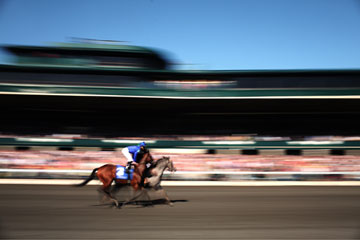
At Keeneland, a premier track in Lexington, Ky., the stakes can run to $750,000.
(4 of 5)
If the sport is to be rescued, though, gambling will undoubtedly be part of the solution, because it remains racing's most lucrative business. Industry leaders see promise in the rise of online betting, which Gagliano told me in a recent interview is a multibillion-dollar proposition--and growing. "It's no longer solely about fannies in seats," he said.
Properly managed, online wagering could help save the sport. To thrive, the online universe needs clean, fair competition. Online gamblers can visit tracks across the country and around the world from their kitchen tables; common sense says they will prefer the places where they won't lose to cheaters. Well-run, well-regulated tracks, at home and abroad, will have the edge. This is why Churchill Downs and the other Triple Crown racetracks have installed elaborate surveillance systems to keep a careful eye on the treatment of horses entered in their signature races.
With so much potential to expand the audience, the Internet might also push the sport to improve its marketing--something the more enlightened industry leaders have been attempting to do in recent years. Under the brand name America's Best Racing, they have launched websites, designed social games, even loaded a team of fresh-faced young people onto a tour bus to visit such buzzy scenes as the SXSW festival in Austin and Miami's South Beach in winter: Up With Horses, you might say. What remains to be done is to persuade the owners to seek more durable horses and keep them running year by year. The sensational appeal of Laura Hillenbrand's book Seabiscuit, which retold the thrilling story of that underdog Thoroughbred's long rivalry with Triple Crown winner War Admiral, ought to have awakened the industry to the value of horses that the public has time to get to know. "What makes the sport great is the horse itself," says Simendinger.
But a fourth force in racing could thwart such change: the state agencies that regulate the sport and pocket a share of the handle. Faced with strapped budgets and grouchy taxpayers, these fiefs may be reluctant to get on board. Even commonsense reforms are likely to lead to fewer tracks, fewer (and stronger) horses and shorter seasons packed with more exciting races. Gagliano calls this "a flight to quality," and it is the most promising path to salvation for the industry. In the short term, however, it will also mean a further drop in revenue for those states where unsung horses run at dilapidated tracks in claiming races that are forgotten almost before they are over. The future of racing--if it has one--will be survival of the fittest.
Strong Horses, Large Fields
